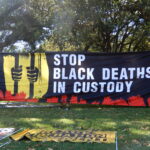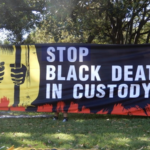Killer Cop Dismissed From Police Force

The Northern Territory police officer who shot and killed Indigenous man Kumanjayi Walker in 2019, has been formally dismissed from the Northern Territory Police Force.
Now-former officer Zachary Rolfe was acquitted of three charges – murder, manslaughter and committing a violent act causing death – by a jury of his peers last year over his fatal shooting of nineteen year old Kumanjayi Walker during an attempt to arrest him in the remote community of Yuendumu, about 300 kilometers north-west of Alice Springs.
After the trial, several media outlets applied to have suppression orders lifted on material that was not admissible in the trial.
History of misconduct inadmissible
The material held from the jury included details of incidents of violence by Mr Rolfe during the arrest of four young Aboriginal men – who required medical treatment as a result. That incident occurred shortly before shot fatally shot Kumanjayi Walker.
Other material included evidence the officer had falsified police reports and sought to pervert the course of justice – on one occasion asking a fellow officer to scratch him to make it appear he had been harmed during an arrest.
The material also included text messages which have been widely published in which Mr Rolfe describes Alice Springs as a “shit hole” and like the “wild west”.
Mr Rolf’s criminal defence lawyers successfully applied to have this material inadmissible at his trial, based on the fact no findings of wrongdoing had been made against him in relation to the four allegedly violent arrests, and because they were not directly relevant to the shooting death of Kumanjayi Walker.
Such material is called ‘tendency evidence’ which might show that Mr Rolfe had a history of using excessive force during arrests. However, given the material was not presented in court, the jury was unaware of this history.
Public Interest Dismissal
At the time of its release, material made pretty shocking reading about the state of the NT’s police force, which has long been criticised for brutal systemic racism and the excessive force regularly applied during arrest and in custody – sickening stories of which came to light during the Royal Commission into Youth Detention.
Yet, even despite the damning material being made public, Mr Rolfe remained on the police force, until last week when he was issued with a formal dismissal notice under section 78 of the NT Police Administration Act.
The dismissal is reported not to be specifically in relation to the shooting death of Kumanjayi Walker, but rather in relation to a statement published online earlier this year, attributed to Mr Rolfe, which appeared primarily to be an attempt to defend his own character. It was highly critical of the NT Police’s leadership as well as the ongoing coronial inquest into the death of Kumanjayi Walker.
Section 78 outlines public interest dismissal, and it states:
“Notwithstanding anything else in this Act, a member may be immediately dismissed from the Police Force where the Commissioner:
(a) is of the opinion that the member has committed a breach of discipline and it is in the public interest that the member be immediately dismissed; and
(b) has taken into account any written response of the member made after service on the member of a notice under section 79.
Section 79 details the service of notice for alleged breach of discipline.
Coronial Inquest
After publishing the open letter online in February, Mr Rolfe left Australia, and is still overseas, despite still being expected to give evidence at the Coronial Inquest into Kumanjayi Walker’s death.
The coronial inquest, which has been hampered by delays, was re-started in March. Zachary Rolfe is currently appealing a NT Supreme Court ruling that he should front the inquiry to answer questions about the text messages, his alleged excessive use of force and allegations he falsified a police recruitment application at the inquest.
His appeal – which is due to be heard in the coming days – will argue that Mr Rolfe should not be required to answer questions that could lead to disciplinary action within the police force – it’s not clear how the recent dismissal notice would impact that argument.
Mr Rolfe’s lawyers have confirmed in a statement that he intends to appeal the dismissal notice, “and exercise the full legal options available to him challenging the validity of the decision, the failure to afford fairness and the process by which it was made, the lawfulness of the decision, and also the merits of the decision.”
Dismissal from the NSW Police Force
In New South Wales, the Police Commissioner has similar powers dismiss an officer, under section 181D of the NSW Police Act. There is a process to the dismissal, but it ultimately gives the commissioner the power to make an order in writing, to remove a police officer from the NSW Police Force if the Commissioner does not have confidence in the police officer’s suitability to continue as a police officer, having regard to the police officer’s competence, integrity, performance or conduct.
In October last year NSW Police Commissioner Karen Webb issued a 181D notice to an officer who was filmed kicking an Indigenous teenager in the head while he was handcuffed and sitting on the ground.







